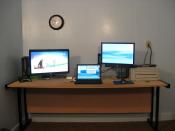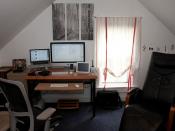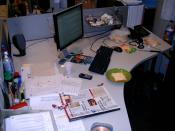Before beginning a project is it necessary to clean off the desk or work surfaces? Is the desk crowded with objects or piles that are seldom used or referred to? Does a full desk indicate a busy and competent worker? A person who answers yes to any of these questions may need to declare war on clutter.
The work environment should be the most efficient area of a person=s life. Looking around the average workplace, many desks are piled high with towers of papers, rarely used office supplies or equipment, and assorted knickknacks. Cleaning the work area will give a person a more efficient workspace and make life easier. The person will benefit from the psychological impact of the reduction of clutter as well.
Clutter, from the middle English word coagulate or clot, is defined by Webster as: 1) to fill with scattered things that impede movement or reduce efficiency or 2) crowded confusion.
I am sure both definitions would work for anyone wasting their valuable time searching frantically to find that needed phone number under the mountain of mess on their desk. Cluttered, messy, disordered, untidy, jumbled, chaotic encumbered, confused, or muddled; any of those words describes the condition of the typical worker=s desk. Clutter is the enemy, robbing the worker of valuable time and efficiency.
Many desks share the common trait of having a clean area about the size of a piece of paper left to work on, with the remainder of the desk space covered by looming malevolent piles of equipment, heaps of intimidating towers of papers, and clusters of non-essential knickknacks. How much confidence does a person have in someone working off the disordered desk? How much precious time does a person waste searching for things under the stacks of junk?...


